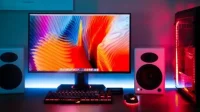Apple hasn’t stopped selling Intel Macs yet, but it’s safe to say we’ll never see a Mac with one of the 12th Gen Intel Core processors. But this minor detail does not prevent the Hackintosh community from supporting new processors and platforms from Intel and AMD. The developers of OpenCore, the most powerful and actively maintained bootloader for booting macOS on standard PC hardware, have improved support for Alder Lake with this month’s release of version 0.7.7. In a blog post published over the weekend, the developers also detailed their efforts to update OpenCore and related software to work with the Intel Z690 chipset.
The key to creating a functional Hackintosh is usually to build a PC that is as close to the actual Intel Mac hardware as possible – most importantly, the CPU, GPU, and chipset. OpenCore’s job is to bridge any gap left between your PC and the actual Mac hardware in order for macOS to boot and work properly.
It adds support for reading and loading macOS file systems, loads kernel extensions to support additional hardware, tells macOS how to handle your system’s audio outputs and USB ports, and swaps hardware to take advantage of native macOS support (if, for example, your PC has a GPU, which is similar, but not exactly identical, to the GPU included in a real Intel Mac).
As OpenCore has evolved and improved, it has gotten better and better at bridging the bigger and bigger gaps between PC hardware and “real”Macs. It can run older versions of macOS such as Tiger (10.4) and Snow Leopard (10.6) on older hardware, and can even be used to run newer versions of macOS on real Macs that Apple has removed from the official support list. It can even run macOS on AMD processors, albeit with some caveats for software that relies on Intel-specific features. The still active Hackintosh Reddit community is full of people using macOS on a wide variety of devices.
It is this flexibility that will allow macOS to run on 12th generation Intel processors and the Z690 chipset. All of this to say that running macOS on new hardware is not for the faint of heart and some things just won’t work. Trying to use the new efficiency cores of 12th generation processors (or E-cores) can also cause an overall slowdown because macOS doesn’t know how best to distribute work between different types of cores – macOS doesn’t (and never will) support Intel technology”Thread Director”that you need to implement into your operating system to achieve the best performance.
GPUs from 11th and 12th generation Intel processors will also not work in Hackintosh because they were never supported on real Macs, so you will need to rely on AMD’s dedicated GPU for display output and other tasks (in real Intel Macs, even iMacs and MacBook Pros with dedicated GPUs still use integrated Intel GPUs to encode and decode videos and photos).
Apple is still adding support for newer AMD GPUs in macOS releases, presumably to allow these cards to run on the Mac Pro – Radeon RX 6900, 6800, and RX 6600 XT series are supported – but Apple could easily decide to end support. newer GPUs whenever you want. And Nvidia GPUs are not supported at all.
While I wouldn’t recommend running out and buying Hackintosh parts at this point, the ability of OpenCore and its developers to run macOS on all types of x86 hardware is a remarkable technical achievement. This process can (and probably will) become increasingly difficult to maintain as Intel hardware moves even further away from what Apple uses in actual Intel Macs.
And once Apple decides to completely end support for its Intel Macs, it’s highly unlikely that macOS will be able to run directly on any hardware other than Apple, Intel, or otherwise. But at least for now, the Hackintosh community is still strong, and your 2022 Hackintosh shouldn’t get hung up on 2020 hardware if you don’t want to.


